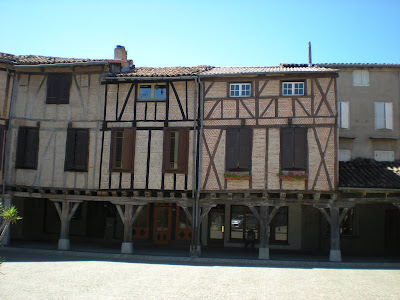When the Tour de France passes by your front door you get a close up view of what all the fuss is about and you can't help but realise that it's something more than "just" a sporting event.
Stage 11 of this year's race was from the village of Blaye-les-Mines to the town of Lavaur, both in the soutwestern département of Tarn.
The route took the riders past the pretty bastide of Castelnau de Montmiral.
 Castelnau de Montmiral
Castelnau de MontmiralTo find exactly where that is, grab a map of France, look at the southwest portion of the hexagon-shaped country where you'll find the city of Toulouse.
Trace a path back northeast or at roughly two o'clock on a watch face and you'll come across Gaillac.
It's one of France's oldest wine-producing areas and, it has to be said, also one of the country's best-kept Appellation d’origine contrôlée (AOC) secrets.
Just northwest of the town, and set in the area's typical rolling countryside, surrounded by vineyards and fields of sunflowers is
Castelnau de Montmiral, a village well worthy of its rating as a member of France's 155-strong association,
Les plus beaux villages de France (France's most beautiful villages).
A wander up the lane would be all it would take to be afforded a view of the riders as they raced past the foot of the village.
The Tour de France is much more than just about the sport of cycling, a glimpse of the riders, the unreasonable endurance or - dare it be said - the seemingly ubiquitous drugs scandals.
It's also a living, breathing postcard of the country - televised live nationally for the whole length of each stage, transmitted internationally and followed throughout the world.
The
official website has some pretty impressive stats which drive home just how much of an EVENT it is, and the passion and aura that surrounds it.
It apparently attracts annually between 12 and 15 million spectators, 80 per cent of whom are French and the rest from abroad. That's a lot of mouths to feed along the route and plenty of lolly for local businesses.
Last year each stage was not only broadcast live on national television - just as it is every year - but also transmitted to another 188 countries, 60 of which also carry the event live.
Over 2,000 journalists from 35 countries also come along for the ride for the duration of the three weeks.
The 98 editions (including the current one) of the Tour has visited over 500 different host towns and villages - talk about a wonderful commercial for the French countryside.
And so the list goes on.
Back to that 11th stage- a decade after the Tour had last made its way past Castelnau de Montmiral on its way to Lavaur.
Just a day before this usually quiet and lazy part of rural France had been basking in sun and enjoying temperatures of 34 degrees Celsius.
But overnight storms followed by a morning downpour and that infamous
Vent d'Autan had left temperatures barely poking above 20 degrees.
The riders were expected shortly after 3.00pm (the local paper had said so) but already several hours ahead of time some faithful followers had braved the rain and wind and were waiting patiently.
And with good cause, because ahead of the race there was the Advertising Caravan, a procession of sponsors' vehicles that set off a good hour-and-a-half before the riders and got the spectators "in the mood" as it wound it way along the course.
 A truck in the Advertising Caravan
A truck in the Advertising CaravanThe first obvious sign that the riders weren't far away came from a commentary car telling spectators that the race leaders were just behind, three-and-a-half minutes ahead of the peloton.
It was soon followed by a motorcade of gendarmes, television cameras on motorbikes, organiser's cars and those from some of the teams and hovering above was a helicopter.
It was clear the leaders weren't far behind.
And sure enough, there they were, the breakaway group of a handful of riders, flashing past and disappearing down the hill towards the nearby town of Gaillac.
 The breakaway group arrives
The breakaway group arrivesBut it wasn't over. Far from it.
The first helicopter had been joined by five others; some circling the village of Castelnau de Montmiral, broadcasting those aerial pictures for which the Tour television coverage is so famous, others keeping track along with their motorised colleagues of the progress of the peloton.
And there it was, the peloton, so distinctively familiar to anyone who has followed even a part of one stage of the Tour on the television.
Up close it was electric. As it approached, individual riders seemed lost in the general blur.
But there, just there for a split second was the yellow jersey of the current race leader, 32-year-old Frenchman Thomas Voeckler, tucked in behind the rest of his Europcar team.
 The peloton with Thomas Voeckler in yellow
The peloton with Thomas Voeckler in yellowAs it sped past followed by a stream of team cars, more motorbike cameramen and commentators, spectators cheered, just as they probably do throughout the whole of the around 3,600-kilometre Tour year in, year out.
 The peloton on the way to Gaillac
The peloton on the way to Gaillac Team cars
Team carsAnd then it was over.
The last few stragglers had vanished out of sight and for the local Montmiralais Montmiralaises continued live coverage of this year's Tour would have to be from the comfort of their sitting room.
But La Grande Boucle, as it's nicknamed in France, was of course far from being over.
The riders might have left behind them the village of Castelnau de Montmiral and be on their way to Lavuar via Gaillac, but this year's Tour still has another 11 days to go before it ends in Paris on July 24 on the Avenue des Champs-Élysées.
And those include mountain stages in both the Pyrénées and the Alps.































